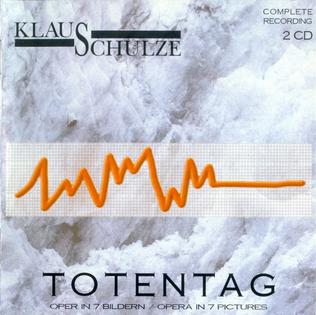
German Romanticism was the dominant intellectual movement of German-speaking countries in the late 18th and early 19th centuries, influencing philosophy, aesthetics, literature, and criticism. Compared to English Romanticism, the German variety developed relatively early, and, in the opening years, coincided with Weimar Classicism (1772–1805).

Klaus Schulze was a German electronic music pioneer, composer and musician. He also used the alias Richard Wahnfried and was a member of the Krautrock bands Tangerine Dream, Ash Ra Tempel, and the Cosmic Jokers before launching a solo career consisting of more than 60 albums released across six decades.
Karl Richter was a German conductor, choirmaster, organist, and harpsichordist.

The sonatas and partitas for solo violin are a set of six works composed by Johann Sebastian Bach. They are sometimes referred to in English as the sonatas and partias for solo violin in accordance with Bach's headings in the autograph manuscript: "Partia" was commonly used in German-speaking regions during Bach's time, whereas the Italian "partita" was introduced to this set in the 1879 Bach Gesellschaft edition, having become standard by that time. The set consists of three sonatas da chiesa in four movements and three partitas in dance-form movements. The 2nd Partita is widely known for its Chaconne, considered one of the most masterly and expressive works ever written for solo violin.

Heinrich Picot de Peccaduc, Freiherr von Herzogenberg was an Austrian composer and conductor descended from a French aristocratic family.

Irrlicht is the first album by Klaus Schulze. Originally released in 1972, in 2006 it was the sixteenth Schulze album reissued by Revisited Records as part of a series of Schulze album reissues. Recorded without synthesizers, Irrlicht's set of "early organ drone experiments" is "not exactly the music for which KS got famous".

Audentity is the fifteenth album by Klaus Schulze. It was originally released in 1983, and in 2005 was the eleventh Schulze album reissued by Revisited Records. The reissue of Audentity is one of two instances of a Klaus Schulze reissue featuring a track order changed from that of the original release.

Dziękuję Poland Live '83 is the sixteenth album by Klaus Schulze. It was originally released in 1983, and in 2006 was the seventeenth Schulze album reissued by Revisited Records. "Katowice" is essentially a live version of "Spielglocken" from Audentity. "Lodz" is essentially a live version of "Ludwig II von Bayern" from X. "Dzien dobry!" is an alternate take of "Katowice"/"Spielglocken".

Totentag is an electronic opera and the twenty-ninth album by Klaus Schulze. It was originally released in 1994; its libretto is inspired by the last days of the expressionist poet Georg Trakl. This is the seventh and last of the early-1990s Klaus Schulze albums not to be reissued by Revisited Records. Totentag was released after Schulze's Silver Edition 10-disc CD box set, technically making this album his thirty-ninth.
Heimo Erbse was a German composer from Rudolstadt.

La Vie Electronique is a series of multi-disc CD releases by Klaus Schulze, reissuing material from his limited edition 50-disc CD box set The Ultimate Edition (2000), which itself collected the previously released limited edition multi-disc box sets Silver Edition, Historic Edition, and Jubilee Edition, along with an additional 5 discs. The series began in 2009 with a plan to release all the music from The Ultimate Edition in chronological order. Four volumes were released in 2009, and four more were released in 2010. The next two volumes were released in 2011, with the next two following in 2012. The thirteenth volume was released in 2013, and the fourteenth and fifteenth volumes in 2014. The sixteenth and final volume, containing five CDs rather than the usual three, was released on May 29, 2015.

L'arpa festante is a German chamber orchestra, specializing in the revival and performance of unknown works, especially from the Baroque era. It was established in Munich in 1983 by Michi Gaigg, who also led the ensemble as concertmaster until 1995. The ensemble takes its name from Giovanni Battista Maccioni's dramatic cantata L'arpa festante which was first performed in 1653, inaugurating what was to become the Bavarian State Opera.
Lola Montez, the King's Dancer is a 1922 German silent historical drama film directed by Willi Wolff and starring Ellen Richter, Arnold Korff, and Fritz Kampers. It portrays the life of Lola Montez. The film was produced by Richter's own production company, but was released by the dominant German distributor UFA.










